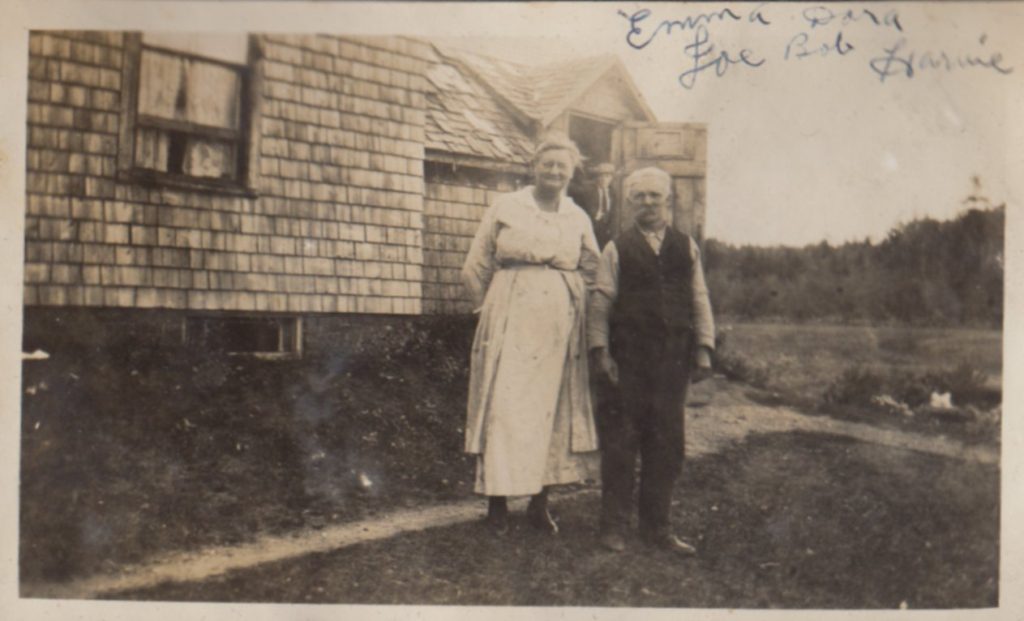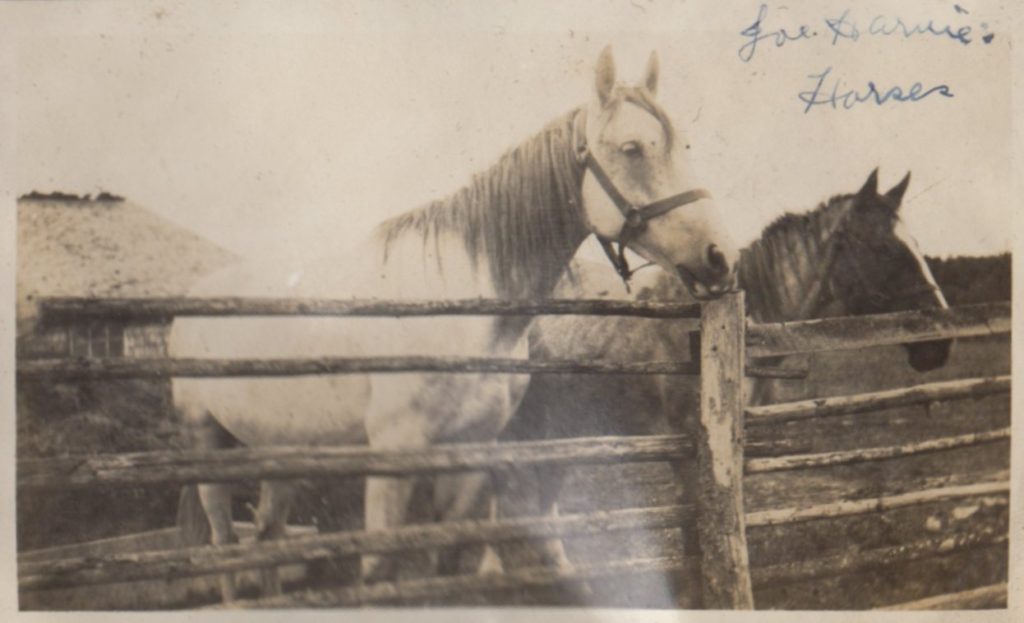
Joe Harvie owned a farm in Kelleyville on a sideroad near Skull House. It was a quiet place, where one seldom saw a car, or for that matter, any kind of a vehicle pass their gate. From the farmyard, you saw rolling hills on one side, and gentle flatness of a fertile interval on the other, and a narrow brook meandered through the fields, crossing the sideroad, and disappearing into the thicket beyond, eventually spilling into the Halfway River. The house was painted white at one time, but the rest of the buildings were bare wood, for it seemed only the more affluent could afford paint on outbuildings.

I am not sure if he had a pair of horses or just one, and I don’t remember him hauling anything to Hantsport, but he came to our place when we lived where the Strickland barn is now, to plow up the ground for us to plant. I remember that it was near the middle of July before he came, because, as he said, he was swamped with work of his own to take care of.
“It’s kinda late,” I said to Daddy. “It’ll be winter before we can dig them up!”
“Don’t worry,” he told me, “there will be plenty of time to grow a good crop.”
Daddy wanted the garden among the apple trees, and Joe didn’t want to hold the plow and drive the horse among the trees, so he had me lead the horse by the bridle. I was only fourteen years old at the time, and as I led the animal up and down between the tree, I had to step lively to keep my feet clear of the horse’s rather large hooves. We had nearly finished the last furrow, when I couldn’t make another step, because one of the hooves landed on top of my foot, and I was anchored.
I wasn’t in pain, because the corks were at each side of my sneaker, the flat part pressing it down into the soft earth, anchoring me on the spot. Try as I might, I couldn’t budge the animal. It probably weighed about 1800 pounds while I barely weighed more than a hundred, and standing so close, I couldn’t get leverage. Joe, who never remembered my name for as long as I knew him, stood at the plow handles, looking for all the world as if he were trying to push it, kept shouting at me.
“Get goin’ boy,” he yelled, but I shouted back at him yelling. “He’s standin’ on my foot!”
What?” shouted Joe.
“He’s standin’ on my foot,” I shouted back, ‘‘and he won’t move.”
The old man muttered something under his breath as he came up to the front to see for himself. After seeing me up against the horse’s head, he took the bridle and gently moved the horse to the right, freeing my foot.
“Are you hurt bad?” A genuine look of concern on his face as he spoke to me.
“It don’t hurt at all,” I answered, wiggling my toes inside my sneaker. “The corks didn’t touch me.”
“Thank goodness, he said breathing a sigh of relief. “I still need you to finish this furrow.” As he walked back to the plow handles, I heard him say, “don’t walk too close to the horse’s feet.”

We finished the furrow, and pulled the plow to the side, then he hooked up the spring toothed harrow. Joe sat under a tree while I led the horse up and down the patch until the ground was all worked up, then we hitched to the plow again and made furrows for planting, and the job was done.
There was a good view of the farm from the Bishopville Road which was on high ground. Since there were just Mr. and Mrs. Harvie on the farm, I had little reason to go there, except when Daddy needed to grind his ax, and I was commandeered to turn the crank. I suppose I have had many miserable jobs in my lifetime, but I am quite sure it is safe to say that none were quite as miserable as having to turn the grindstone while my father sharpened his ax. Of course, it didn’t help, that the shaft of the stone turned on bare wood. It didn’t help a bit when Daddy pressed down hard on the stone, acting like a brake; and it goes without saying that after every ax grinding, we were not the very best of friends.
At the end of every grinding, I vowed to be nowhere near home whenever Daddy needed to grind his ax, but he kept a sharp eye, giving me the impression everything was fine, then he would spring it on me.
“Come with me, Harold, he would say, “we’re going down to Joe Harvie’s to grind my ax.”
Things got so bad with me, that I even sneaked down to Joe’s farm to tell him not to let Daddy grind his ax there anymore, but before I could even bring up the subject, Joe smiled at me, beckoning me to follow him out to the equipment shed.
“I’m glad you’re here, boy,” he said, “the cutter bar on my mowing machine needs sharpening, and I need someone to turn the crank.”
I could feel my jaw dropping down to my knees. This was going to take forever! There would be either sixteen or twenty teeth to grind on both sides, depending on the length of the cutter bar.
When we got to the shed, and he looked over the teeth, he shook his head a little, saying, “I guess these teeth are worn out. “I guess I’ll just change them.” He looked up at me and said. “I’ll need you to hold the bar while I knock out the rivets and put new teeth on.”
It took a little more than an hour, as I held the bar on the anvil while he skillfully knocked out the rivets holding the worn teeth, using a punch and the sharp crack of his blacksmith’s hammer, then re-rivet new ones in their place. When it was done, I helped him insert the bar onto the mowing frame, and attach the ball to the pitman arm, and the mower was ready for action.
After the job was done, I couldn’t help but be impressed by his complete command of his machinery, and some years later, when I worked for a custom combiner in Texas, the boss was just as impressed with me when I was able to replace worn sections of the twenty foot scythe with new ones. And it was all because I helped Joe Harvie with his cutter bar on a day when I was trying to wiggle out of turning the grindstone so Daddy could grind his ax.
About the garden? That September, we dug up a garden full of nice potatoes for the winter. It wasn’t too late after all…
Source: The Hants Journal, Windsor, N.S., Wednesday, October 31, 1990 (reprinted by permission)
Photos: Ethel Alley (Mrs. H.A. Hart) 1920
